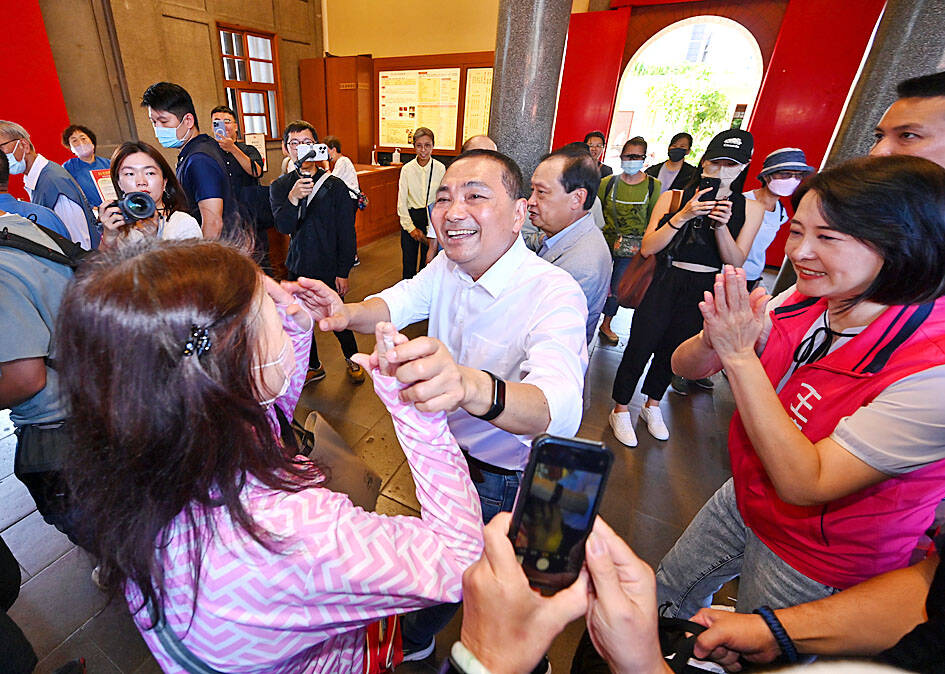The Chinese Nationalist Party (KMT) yesterday announced that it would enter into “party-to-party negotiations” with the Taiwan People’s Party (TPP) over possible collaboration for the Jan. 13 presidential and legislative elections, after deciding there is no longer enough time to hold polls or a primary to decide on a joint presidential candidate.
The two opposition parties have been at loggerheads over how to evaluate the “strongest” presidential candidate to run against Democratic Progressive Party (DPP) presidential candidate Vice President William Lai (賴清德).
With less than 80 days remaining until the election, Lai’s support ranges from 26.5 to 42.6 percent according to Taiwan’s major pollsters, although some polls indicate his lead has fallen slightly.

Photo: Liu Hsin-de, Taipei Times
TPP Chairman and candidate Ko Wen-je (柯文哲) remains in second place, leading the KMT’s Hou You-yi (侯友宜), with tycoon Terry Gou (郭台銘), an independent, in last place.
This indicates that cooperation between Ko and Hou could be crucial if the DPP is to be defeated.
Asked yesterday to comment on the standoff between the KMT and TPP, Hou said with the Nov. 24 deadline for presidential candidate registration looming, neither conducting polls, as proposed by the TPP, nor a primary, as the KMT has insisted on, could be completed in time.
As such, “party-to-party negotiations” are the only viable solution, Hou said, adding that the idea of forming a “governing coalition” proposed by Ko is a non-starter if the two parties do not work together for the elections.
Asked whether there was still a chance the two parties could opt for polls or a primary, Hou answered in the negative, adding that he was “absolutely positive” that the two sides were poised to begin party-to-party talks.
A KMT source, who asked not to be identified, said that the party has no preconditions for party-to-party negotiations and is open to discussing collaboration.
The idea of holding “party-to-party negotiations” to discuss collaboration for the Jan. 13 elections and a governing coalition was first proposed by Ko during a meeting with KMT chairman Eric Chu (朱立倫) earlier this month.
Later in the day, Ko was asked by reporters to respond to the stalemate, but said there are many ways political parties could collaborate that are not limited to the presidential election, including in the legislative elections and pushing bills through the legislature.
Ko also cited a meeting with former legislative speaker Wang Jyn-ping (王金平) on Wednesday, during which Wang suggested that Ko “put yourself in others’ shoes” when it comes to forging a possible KMT-TPP joint presidential ticket.
While still critical of the KMT’s proposed primary and half-poll, half-primary approaches as “unfair,” Ko said he would not insist on a specific course of action, adding that he would agree to hold party-to-party negotiations “since Hou is so persistent.”
Asked whether he would still agree to initiate party-to-party talks if neither a Hou-Ko nor a Ko-Hou ticket were the best combination to defeat Lai, Ko said that had the parties agreed to use polls, the answer would have been clear immediately, but “in real-world scenarios, you cannot always rely on science” and sometimes have to give way to collective wisdom.
Any forthcoming KMT-TPP negotiations should include Hou, Chu and himself, Ko added.

CAUTION: Based on intelligence from the nation’s security agencies, MOFA has cautioned Taiwanese travelers about heightened safety risks in China-friendly countries The Ministry of Foreign Affairs (MOFA) yesterday urged Taiwanese to be aware of their safety when traveling abroad, especially in countries that are friendly to China. China in June last year issued 22 guidelines that allow its courts to try in absentia and sentence to death so-called “diehard” Taiwanese independence activists, even though Chinese courts have no jurisdiction in Taiwan. Late last month, a senior Chinese official gave closed-door instructions to state security units to implement the guidelines in countries friendly to China, a government memo and a senior Taiwan security official said, based on information gathered by Taiwan’s intelligence agency. The

The National Immigration Agency (NIA) said yesterday that it will revoke the dependent-based residence permit of a Chinese social media influencer who reportedly “openly advocated for [China’s] unification through military force” with Taiwan. The Chinese national, identified by her surname Liu (劉), will have her residence permit revoked in accordance with Article 14 of the “Measures for the permission of family- based residence, long-term residence and settlement of people from the Mainland Area in the Taiwan Area,” the NIA said in a news release. The agency explained it received reports that Liu made “unifying Taiwan through military force” statements on her online

Taiwan Semiconductor Manufacturing Co (TSMC), the world’s largest contract chipmaker, said yesterday that it is looking to hire 8,000 people this year, at a time when the tech giant is expanding production capacity to maintain its lead over competitors. To attract talent, TSMC would launch a large-scale recruitment campaign on campuses across Taiwan, where a newly recruited engineer with a master’s degree could expect to receive an average salary of NT$2.2 million (US$60,912), which is much higher than the 2023 national average of NT$709,000 for those in the same category, according to government statistics. TSMC, which accounted for more than 60 percent

A magnitude 5.7 earthquake struck off Taitung County at 1:09pm today, the Central Weather Administration (CWA) said. The hypocenter was 53km northeast of Taitung County Hall at a depth of 12.5km, CWA data showed. The intensity of the quake, which gauges the actual effect of a seismic event, measured 4 in Taitung County and Hualien County on Taiwan's seven-tier intensity scale, the data showed. The quake had an intensity of 3 in Nantou County, Chiayi County, Yunlin County, Kaohsiung and Tainan, the data showed. There were no immediate reports of damage following the quake.